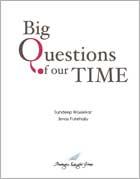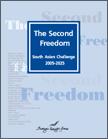EU, Turkey and the World in 2030
 |
August, 2009
By Sundeep Waslekar
|
It would be extremely short-sighted to view the question of the Turkish membership of the European Union in the framework of a balance sheet for the two parties.
It’s well known that the Turkish membership of the EU will benefit both sides by resolving some of their internal problems. Europe is ageing. Its demographic balance will be against productivity by 2050. The youth bulge of Turkey can provide a vital human resource. Europe needs energy and currently depends on Russian gas lines via Ukraine. Turkey can provide alternatives to Russian gas and to Ukraine for the Russian gas.
It is equally known that Turkey has been consistently involved in a tussle between the military and democracy. Since the European Union is based on the Copenhagen Criteria of democracy and civil liberties, membership can strengthen the Turkish democracy. The European membership can also enable peaceful co-existence between Greece and Turkey. In this balance sheet, trade and investments will account for a small share of huge political, demographic and cultural profit on both sides.
However, to an international observer, the gains that Europe and Turkey will accrue are not significant as compared to the paradigm shifts that may take place in the world politics. Whether one foresees or not, Turkey is emerging as an economic great power of the 21st century. Who had guessed China in the 1970s, India in the 1980s and Brazil in the 1990s? Within less than 40, 30 and 20 years, these countries are fast emerging as main drivers of the world economy. Those who cannot foresee that Turkey will be a major economy by 2020 or 2030 are making the same mistakes that the observers of China and India made in the 1970s. Until about a decade ago, the Turkish economy was confined to a few business interests in Istanbul. Since the rise of the AK Party earlier this decade, small businessmen and farmers from Anatolia have been empowered. The economic landscape of Turkey is changing, most visibly demonstrated in insecurity felt by the status quo interests. If Turkey continues its economic drive and also manages to emerge at the centre of a network of energy lines, it will be a global player in a couple of decades.
Turkey is also set to be a regional hydro-power. Israel, Palestine Territories and Jordan – the core of the Middle East – face acute shortage of water. The Jordan River is likely to deplete by 2100 due to climate change, according to a recent study. The underground aquifers in the West Bank are being overused. The water crisis that will be faced by Israel, Palestine Territories and Jordan will be much worse than the avoidable conflict they have been involved in the last 60 years. Syria, Iraq and Lebanon have enough water for their own population but they lack infrastructure to generate surplus. In 15-20 years only Turkey will be in a position to come to the rescue of the entire region, particularly Israel and the Palestine Territories. Thus, the area of the Turkish influence will not be limited to the eastern borders of Anatolia. It will spread all the way to the Gulf.
The European Union has to decide whether it will be in its interests to have Turkey as a member, following its rules and providing bridge to the Arab and Asian regions, or whether it wants to have a superpower on its eastern border. If Europe and Turkey are part of the Union, they will be able to check the United States and Russia. Otherwise, the United States and Russia will play the two against each other and try to maximise their own space in Eurasia. What game Iran will play will depend on Iran’s strength in a couple of decades. However, if Europe, Turkey, the US and Russia are all engaged in a power game, Iran will be tempted to maximise its interests whenever it finds opportunities. On the other hand, if Turkey is part of the European Union and an Arab-Israeli hydropower union, Iran’s manoeuvring space will be limited.
The question of the Turkish membership of the EU is essentially about whether we want a world of great power rivalries or whether we want a world of cooperation and strategic stability. It is also a question whether visionary statesmen should shape the 21st century or whether unemployed young people should determine its future. It is interesting to note who is supporting the Turkish membership of the European Union and who is opposing it. The supporters include statesmen like Obama and Carl Bildt. The opponents include unemployed young people in France, Germany, the Netherlands and their petty vote catchers.
It would be tragic to seek answers to the big questions of our time on the basis of short term political calculations. The world paid the price of the Paris 1919 conference that enraged Germany, divided the Middle East and ignored colonisation. The net loss was 100 million deaths in the bloodiest century in history. Which sane person can ever sleep after reading about the great achievements of the 20th century – massacres by Hitler and Pol Pot, ethnic cleansing in Rwanda, a nuclear arms race and blowing up of ten trillion dollars per decade on arms while 100 million children die on account of malnutrition? Should we congratulate the proponents of a world based on competition for power? Or should we hope that new ways will be found to craft a future that is based on cooperation rather than competition - where the Turkish membership of the European Union is used as one powerful tool to create a collaborative world order? Of course, there would be other tools as well and we should create and use them, but since Turkey is on the cross-roads of continents and civilizations, it is imperative we emphasise its strategic role.
Related Publications
-
.jpg&maxw=50)
Big Questions of Our time: The World Speaks, 2016
Download:Big Questions of Our time: The World Speaks _Full Report
-

-

Second Freedom South Asian Challenge 2005-2025, 2005
read more
Download:Second Freedom South Asian Challenge 2005-2025 Full Report
Related latest News
Related Conferences Reports
-

Global Challenges Conference, October 2016
Download:Global Challenges Conference Report
-

Conference on Responsibility to the Future: Business, Peace and Sustainability, June, 2008
Download:Global Security and Economy: Emerging Issues


